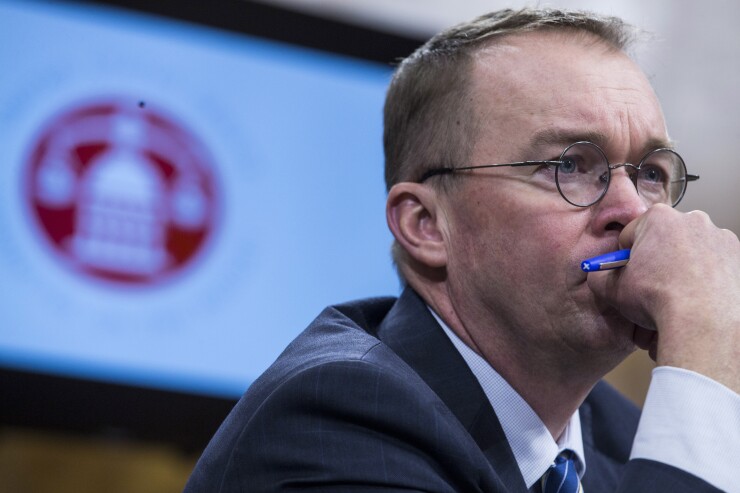Want unlimited access to top ideas and insights?
In Washington, federal agencies — no matter which political party controls the government — rarely give up their power.
But if acting Consumer Financial Protection Bureau Director Mick Mulvaney has his way, his agency would effectively become a backup regulator, ceding authority over virtually every firm for which it has jurisdiction to other state and federal authorities.
In the past week, Mulvaney has made two speeches to different audiences in which he discussed his plans. On Feb. 28, he

Taken together, it's clear Mulvaney envisions an agency that takes a back seat to other authorities, rarely stepping out in front.
"He's saying the CFPB is not going to be leading the charge, but that the states and prudential regulators will be in the vanguard, and the CFPB will not be the leader it was," said Kathleen Ryan, a partner at Akerman and a former deputy assistant director for the CFPB's Office of Regulations.
Since 2004, there has been a power shift toward states and now state attorneys general have become far more visible defenders of consumers' rights. That is expected to continue further with the CFPB's new Republican leadership.
Joe Jacquot, a partner and business attorney at Foley & Lardner and a former chief deputy attorney general of Florida, says Mulvaney's strategy is a breath of fresh air.
"It could be seen as refreshing, that here's someone that is not consolidating power," said Jacquot. "He believes in the structure of federalism and that state AGs have a better sense of what's happening on the ground."
Mulvaney's views are closely aligned with the Trump administration's emerging regulatory strategy, described by Deputy U.S. Attorney General Rod Rosenstein last week, as one of "self-reporting and cooperation" by regulated companies.
Mulvaney has said he will put a priority on criminal actions and fraud, "as opposed to just going after where the big pots of money are," Jacquot said.
Former CFPB Director Richard Cordray, Mulvaney's predecessor, was accused by House Republicans of courting plaintiff's lawyers and routinely cited the $12 billion in relief that the CFPB brought in through enforcement actions as proof that the agency was working on behalf of consumers.
Attorneys general asked pointed questions of Mulvaney last week about whether he would be vigilant in pursuing cases where consumers are harmed. Dodd-Frank requires that states provide notice to the CFPB, to allow the agency to intervene in an investigation or lawsuit, if it chooses to do so.
Pennsylvania's newly elected attorney general, Josh Shapiro, asked Mulvaney if he planned to hold up any state actions. Mulvaney's response was essentially: "No."
"The statute allows the state AGs to enforce the federal laws and how they do that is up to them," Mulvaney said. "I don't think it's my role to tell the state AGs what they can do. I don't think there's a federal role in the statute that tells them what they can or cannot do."
Consumer groups say the bureau's mission is being torn asunder.
"Mick Mulvaney is stopping the CFPB from doing what its mission is, which is enforcing consumer protection laws, and he doesn't care if others pick up the ball," said Karl Frisch, executive director of Allied Progress, a consumer watchdog group.
The change is obviously a radical departure from Cordray, who was known for aggressively asserting the CFPB's authority. Though it is not surprising that a Republican-appointed director would want to dial back the CFPB's activities, Mulvaney is planning to go further than many observers expected.
He has already said he does not foresee using much or any of the CFPB's rulemaking powers unless it is to ease regulations already promulgated. Some think he is laying the groundwork for
"Some observers might believe that the CFPB is not going to be bringing as many enforcement actions and some state attorneys general might choose to pursue enforcement actions where the CFPB might otherwise have done that," said Allyson Baker, a partner with the law firm Venable.
Many state banking regulators who had front-row seats for the financial crisis and provided input in the drafting of Dodd-Frank said there is irony in Mulvaney now turning to the states for leadership.
While Republican lawmakers generally are deferential to states' rights, many Republicans were vehement defenders of federal preemption for national banks leading up to the financial crisis.
Before the mortgage meltdown, for example, Republicans were adamant that states could not pass laws affecting banks because it would be an infringement of the National Bank Act. Republicans claimed preemption when states began passing laws restricting foreclosures though there is no federal foreclosure statute.
Mulvaney, who was a congressman from South Carolina before stepping down last year to become head of the Office of Management and Budget, had been elected to office in 2010 in a wave of Tea Party enthusiasm.
Though many House Republicans have claimed the CFPB, created in 2010, was an expansion of federal powers, in reality it was a consolidation of 19 different consumer protection laws that previously existed but were not generally enforced by other federal regulators. The Dodd-Frank Act put them under one roof at the CFPB.
Dodd-Frank expressly allowed state attorneys general to pursue companies for violations of certain federal laws, including a ban on unfair, deceptive or abusive acts or practices, known as UDAAP. UDAAP authority was also given to the CFPB.
Mulvaney indicated last month in the CFPB's five-year strategic plan that he also is not interested in pursuing firms for




